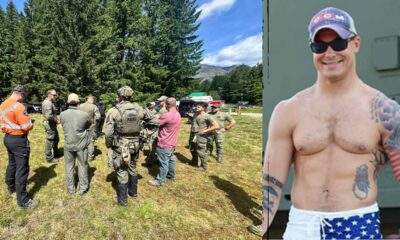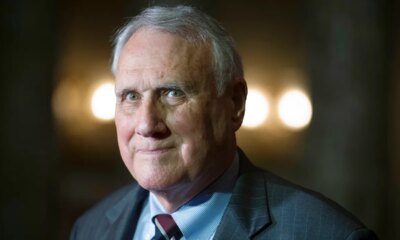Arizona
Arizona men’s basketball: Motiejus Krivas questionable for season opener, Emmanuel Stephen could redshirt

Arizona may have its full compliment of scholarship players available for Monday’s season opener against Canisius, something that wasn’t the case for either of its exhibition games or even the Red-Blue Showcase in early October.
Whether the Wildcats want to use all 11, though, is still to be determined.
UA coach Tommy Lloyd said sophomore center Motiejus Krivas, who missed both preseason games due to an ankle injury, has practiced this week and could be available for the opener. The 7-foot-2 Estonian was projected to be in Arizona’s starting lineup this season, and in his absence 6-foot-8 Tennessee transfer Tobe Awaka has started at the 5.
“I’m not gonna rush that thing,” Lloyd said Thursday about Krivas, who averaged 5.4 points and 4.2 rebounds in 12.1 minutes per game last season. “When he’s ready, we’re ready for him. If (trainer) Justin (Kokoskie) tells me he could play 25 minutes on Monday, I’d love to have him for 25 minutes. I want him back as soon as we can get him, as long Justin and the doctors feel like he’s built for the long haul, that’s the main thing I’m interested in.”
With Krivas out, Awaka has started with redshirt sophomore Henri Veesaar being first off the bench at center. Veesaar averaged 15.5 points in the two exhibition games, while Awaka averaged 13 points and 12 rebounds albeit against massively undersized competition.
Also seeing time in the exhibitions was freshman center Emmanuel Stephen, who in a combined 21 minutes showed both his upside and his rawness. It’s that latter trait that has made him a candidate to redshirt the 2024-25 season, a decision that Lloyd said has yet to be made.
“Like anything here, the player is going to have input,” Lloyd said. “We’ll let him make the choice.”
Using redshirts is something Lloyd has made no secret he’s in favor of, sitting out both Veesaar and Dylan Anderson last season though Veesaar’s redshirt was mostly due to a preseason elbow injury. Anderson has since transferred to Boise State, where he’s expected to start.
“I’m happy Dylan Anderson redshirted last year, I really am,” Lloyd said. “I’m so happy for him. He’s got three good years at Boise to make a huge impact. I would have felt horrible if he would have played and only played limited minutes and then burned a year and now he has only two years to play.
“I wish we would have redshirted Filip (Borovicanin) for him, I wish we would have redshirted Adama (bal) and those guys would have had another year. Anything you can do to lengthen those guys’ careers is a good thing.”
In order for Stephen to redshirt he cannot play in any regular season or postseason games, unlike in football where players can appear in up to four regular season games and still retain a year of eligibility.
“I think it would be great if they could come up with something in basketball,” Lloyd said. “I think eventually they’re going to have to. I mean, obviously football has done and it’s made sense. I just think for health and safety, for personal development. We’re coming out of an era where guys got five years of eligibility. What’s wrong with giving guys whatever, whatever you want to call it, four years plus nine games, whatever the ratio is?”

Arizona
Arizona HS football’s No. 1 2027 prospect has ASU, Miami high on list
Arizona Open Division football championship MVPs on Basha’s big win
“As soon as we stepped on the field, nerves went away and it was just playing football,” Rogers said of Basha’s performance.
Chandler Basha left tackle Jake Hildebrand, the state’s No. 1 2027 college football prospect, said Arizona State and Miami are among the top potential schools on his recently revealed 10-best list.
Miami is playing in the Vrbo Fiesta Bowl as part of the College Football Playoff semifinal against Ole Miss at State Farm Stadium in Glendale on Jan. 8.
Hildebrand, 6-foot-6, 293 pounds, has started every varsity game since his freshman year and helped lead the Bears to the Open Division state title this past season. He won’t be able to attend the Fiesta Bowl because he’s in San Antonio, getting ready to play in the Jan. 10 Navy All-American Bowl. The game airs at 11 a.m. MST on NBC.
Hildebrand also has CFP semifinalists Indiana and Oregon, along with Texas A&M, Alabama, USC, Ohio State and Texas among his top 10 colleges.
“A few schools that are my favorite from the top 10 are ASU, Alabama, Texas A&M, Miami and USC,” Hildebrand said in a direct message to The Arizona Republic. “They have definitely been the schools that have been contacting me the most and built the best relationship with.”
There is no timetable for when Hildebrand will commit. He could wait until he makes trips this spring, summer and fall. But he is among the most coveted left tackles in the country, who has 38 offers, according to 247Sports.
The 247Sports Composite has Hildebrand ranked as the No. 13 overall offensive tackle in the country in the 2027 class. He is ranked No. 1 in the class of 2027 by The Republic.
Richard Obert has been covering high school sports since the 1980s for The Arizona Republic. Catch the best high school sports coverage in the state. Sign up for Azcentral Preps Now. And be sure to subscribe to our daily sports newsletters so you don’t miss a thing. To suggest human-interest story ideas and other news, reach Obert at richard.obert@arizonarepublic.com or 602-316-8827. Follow him on X, formerly Twitter:@azc_obert
Arizona
Future of Arizona’s Oak Flat faces pivotal day in Phoenix courtroom
Apache Stronghold leader’s propane lines severed
Apache Stronghold leader Wendsler Nosie’s propane tank lines were severed. Nosie claims it is related to the controversy surrounding Oak Flat mine.
Three lawsuits aiming to keep the U.S. Forest Service from turning over Oak Flat to a mining company for a massive copper mine go in front of the 9th U.S. Circuit Court of Appeals for arguments Jan. 7.
The British-Australian firm Resolution Copper has long sought the exchange to build a mine that bodes to obliterate a site Apaches and other Native peoples hold sacred. It also is one of Arizona’s few functional wetlands.
Two lawsuits filed by the San Carlos Apache Tribe and a coalition of environmentalists and the Inter Tribal Association of Arizona challenged the land exchange, authorized by a last-minute amendment to a “must-pass” defense bill in December 2014. The arguments in the lawsuits are based on the tribe’s religious beliefs and on environmental concerns, including disputes over water usage and possible damage of one of central Arizona’s key aquifers.
In the third suit, the latest to be filed, a group of Apache women who have spiritual and cultural connections to the site argue that the exchange would violate the Religious Freedom Restoration Act, the First Amendment’s religious rights protections and two environmental laws.
Their lawsuit also brought two new factors into play: a recent U.S. Supreme Court decision that affirms parental rights to direct their children’s religious education and references to Justice Neil Gorsuch’s blistering dissent to the Supreme Court’s refusal to hear another case related to the land exchange.
A three-judge panel will hear the cases at the Sandra Day O’Connor U.S. Courthouse in Phoenix.
Religious rights advocates and First Amendment experts have said the ability of Native peoples to exercise their religious rights is at stake.
Oak Flat story: As an Apache girl enters womanhood, lawsuits and tariffs cast shadows
The struggle over Oak Flat nears 30-year mark
For more than two decades, Oak Flat Campground, known to Apaches as Chi’chil Biłdagoteel, “the place where the Emory oak grows,” has been ground zero in a battle over Native religious rights on public lands as well as environmental preservation for a scarce Arizona ecosystem.
The 2,200-acre primitive campground and riparian zone, within the Tonto National Forest about 60 miles east of Phoenix, also lies over one of the nation’s largest remaining bodies of copper ore.
To obtain the copper, Resolution, which is owned by multinational firms Rio Tinto and BHP, plans to use a method known as block cave mining in which tunnels are drilled beneath the ore body, and then collapsed, leaving the ore to be moved to a crushing facility.
Eventually, the ground would subside, leaving behind a crater about 1,000 feet deep and nearly 2 miles across, obliterating Oak Flat.
Resolution Copper, a British-Australian mining firm, sought Congressional approval to exchange other parcels of land it had purchased with the U.S. Forest Service for nearly 10 years when the late Sen. John McCain, R-Ariz., and other officials engineered a late-night rider to a must-pass defense bill in December 2014. Then-President Barack Obama signed the bill and ever since, tribes, environmentalists and their allies have fought to stop the exchange.
Resolution has said that the mine would bring much-needed jobs and revenues to the economically challenged Copper Triangle to the tune of about $1 billion a year. The company has provided funding to support recovery from the floods that devastated downtown Globe in October and has supported other community organizations.
In November, Resolution announced it had completed rehabilitation of the historic No. 9 shaft at the Magma minehead, including deepening it to nearly 6,900 feet and connecting it to the No. 10 shaft, which plunges about 6,940 feet below the surface.
Vicky Peacey, president and general manager of Resolution, said the shaft project was a huge milestone, employing homegrown talent from surrounding communities to get the job done.
Despite the ongoing litigation, she said, “We are ready to advance this important copper project, enabling thousands of high-paying jobs, billions in economic development for rural Arizona, and access to a domestic supply of copper essential to American security and modern infrastructure.”
Grassroots group Apache Stronghold, led by former San Carlos Apache Tribal Chairman Wendsler Nosie, filed the first lawsuit to stop the exchange. That litigation was declined twice by the U.S. Supreme Court in 2025, but Apache Stronghold continues to fight the land exchange as the group supports the other three lawsuits.
Debra Krol reports on Indigenous communities at the confluence of climate, culture and commerce in Arizona and the Intermountain West. Reach Krol at debra.krol@azcentral.com. Follow her on X, formerly known as Twitter, @debkrol and on Bluesky at @debkrol.bsky.social.
Arizona
Trump issues rare dual endorsement in Arizona swing district

Are Trump’s signature tariffs even legal?
Rising health care costs, limits on executive power and two ongoing conflicts are all substantive issues Trump faces in the new year as midterms near.
President Donald Trump endorsed not one but two Republicans in a highly watched Arizona congressional primary, boosting a new candidate after his first pick met resistance from some in the GOP.
In a Jan. 6 social media post, Trump said he was backing Jay Feely, a former Cardinals kicker and sports commentator who recently switched his campaign into Arizona’s Scottsdale-area 1st Congressional District, in addition to Gina Swoboda, the state GOP chair whose candidacy has divided Republicans despite her securing Trump’s support in October.
The president praised both Feely and Swoboda as “Highly Respected America First Patriots.”
“JAY OR GINA WILL NEVER LET YOU DOWN!” he wrote on Truth Social, the social media platform he owns.
The announcement is a blow to Swoboda, a polarizing figure among Arizona Republicans. Her longtime rivalry with Turning Point, the network of conservative advocacy groups founded by the late activist Charlie Kirk, has shadowed her candidacy, prompting attacks and infighting among Arizona Republicans.
The president’s team had not publicly confirmed his endorsement of Swoboda before the Jan. 6 social media post.
In an interview with The Arizona Republic, Feely said he thought the endorsement came back to his “friendship” and shared values with the president.
“I love what he’s doing. I believe in what he’s doing. I’m committed to the same principles that he and his administration have,” Feely said.
“We wish Gilbert resident Jay Feely well in his latest campaign for Congress, but nothing has changed,” Swoboda campaign consultant Chris Baker shot back in a written statement to The Republic. “Gina Swoboda will be the Republican nominee in AZ01.”
The endorsement will also set back two other high-profile GOP candidates in the race, the ultra-conservative state Rep. Joseph Chaplik and businessman John Trobough, who both told The Republic they, too, had been in touch with the White House.
Though Trump’s endorsement will be a boon in the Republican primary, it could become a liability in the general election. The district, which includes wealthy pockets of Paradise Valley, Scottsdale, and north Phoenix, has a hot-and-cold relationship with the president.
National GOP leaders encouraged him to run in Scottsdale, Feely says
Feely initially launched his campaign in Arizona’s 5th Congressional District, which includes much of Chandler, Queen Creek and Gilbert, where he lives with his family. He billed himself as a home-grown candidate with a “heart to serve,” and a MAGA devotee who has a personal relationship with Trump.
His prospects in that district dimmed after the president endorsed one of his opponents, Mark Lamb, the well-known former sheriff of Pinal County. Early polling showed Lamb with a large advantage in the race.
But Trump took a liking to Feely, encouraging the former football player in a November social media post to “run in a different district, or for a different office.”
Feely followed the president’s advice. He switched his campaign into the Scottsdale district on Dec. 19. Trump’s endorsement followed about two weeks later.
In an interview Feely said national Republican leaders in D.C., and “grassroots leadership” in the Valley, encouraged him to pivot to the Scottsdale seat. He said he spoke several times with House Speaker Mike Johnson on the matter.
“I wanted to do what was best for the team,” he told The Arizona Republic.
“If they wanted me to run in CD1, and they felt like I was the best candidate, and the one that could hold that seat, then I was willing to do that.”
It’s rare but not unheard of for the president to endorse multiple candidates in a single race.
Last year Trump endorsed two congressional hopefuls in a West Valley-area Republican primary, including the eventual winner, U.S. Rep. Abe Hamadeh.
And in Missouri’s 2022 U.S. Senate race, Trump left election-watchers scratching their heads when he endorsed “Eric,” a first name shared by the race’s two front-runners. Both campaigns claimed the endorsement as their own.
For years the Scottsdale-area district has been considered one of the most competitive races in the country. Its incumbent, U.S. Rep. David Schweikert, announced last year he would not seek re-election in 2026, winding down his 15-year tenure on Capitol Hill and setting up a bitter contest for the rare open congressional seat.
Across the aisle, about half a dozen high-profile Democrats are fighting for their party’s nomination.
The candidates have already raised millions of dollars between them, with campaign spending only expected to escalate leading up to the Aug. 4, 2026 primaries. The Nov. 3, 2026, general election will bring millions more expensive television advertisements, mailers, and social media ads to the district, much of it financed by national Republican and Democratic groups wrestling for control over the U.S. House.
Feely has raised more than $1 million, about a third of which he has loaned himself, according to a report filed this fall. His personal financial disclosure shows he is worth at least $15 million, giving him a piggy bank that could help finance a campaign.
Swoboda has raised “quite a bit” of money, said campaign consultant Chris Baker, though her fundraising receipts aren’t yet public.
Rivals slam Feely’s out-of-district residence
Feely’s rivals have slammed him for running in a district where he doesn’t live.
“If Jay Feely wants to travel 50 minutes every day to run in Arizona’s 1st Ccongressional District, where he’s never lived, we will pay for his Uber,” Alfredo Rodriguez, a strategist with the Trobough campaign, wrote in a news release. “Tell him to send us the bill.”
“If Gilbert carpetbagger Jay Feely foolishly thinks he can win in AZ01, then more power to him I guess. But the outcome won’t change – Gina Swoboda will win the Republican primary,” Baker wrote in a statement to The Republic.
Feely said in an interview he has connections to the Scottsdale district, even though he doesn’t actually live there. The district is “about economics” and “represents the entrepreneurial spirit,” he said.
“I’ve invested in companies in this district. My friends and family live in this district. And I want to be an asset to all of them,” Feely said.
-

 News1 week ago
News1 week agoFor those who help the poor, 2025 goes down as a year of chaos
-

 Science1 week ago
Science1 week agoWe Asked for Environmental Fixes in Your State. You Sent In Thousands.
-

 Detroit, MI4 days ago
Detroit, MI4 days ago2 hospitalized after shooting on Lodge Freeway in Detroit
-
Georgia1 week ago
Best in Georgia: 2025 AJC Varsity high school football all-state teams
-

 Dallas, TX3 days ago
Dallas, TX3 days agoDefensive coordinator candidates who could improve Cowboys’ brutal secondary in 2026
-

 Detroit, MI1 week ago
Detroit, MI1 week agoWith 46k outages around Michigan, Metro Detroit prepares for power loss
-

 Southeast1 week ago
Southeast1 week agoMurder in small-town America: The crimes that tore quiet communities apart in 2025
-

 Movie Reviews1 week ago
Movie Reviews1 week ago‘Marty Supreme’ is Supreme Cinema – San Diego Jewish World





















